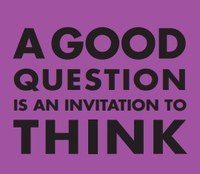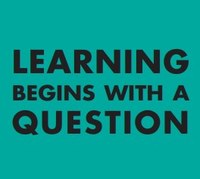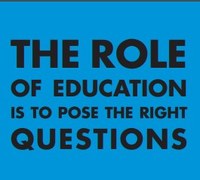Driving Enduring Understanding with Essential Questions
Questions are powerful tools in the hands of a skilled teacher. A recent Faculty Feed post asked… Do Your Questions Drive Critical Thinking? In that post, we pointed out that if we are to help our learners grow in their ability to think critically, we need to ask questions that require more than fact-based answers by structuring questions that force the learner to apply, analyze, evaluate, and create using the factual information. However, is this enough? Let’s ask ourselves some questions to see if we can do even better:
Do your questions also…
- … frame the content to help the learner see a bigger picture?
- … drive for understanding and transferability of knowledge to solve unrelated problems?
- … provoke more questions?
- … help learners make meaning from the content you provide?
- … surface the big ideas of a subject or discipline?
- … cause learners to continuously re-examine a topic to come to a deeper understanding of key principles?
- … make learners better at lifelong learning?

If the answer to these questions is no, then you have the opportunity to develop your skills in designing and asking what are called “essential questions”. These are questions that do the things listed above.
So what? Asking essential questions helps our learners enhance their lifelong learning skills, and our HSC schools’ accrediting bodies want us to teach them how to become lifelong learners. How about some examples of essential and non-essential questions in the science disciplines?
Example 1:
Essential Question: How would an effective researcher go about solving a problem?
Not Essential Question: What steps did you follow to get this answer?
Example 2:
Essential Question: How strong is the scientific evidence for this treatment?
Not Essential Question: What is a variable in this scientific investigation?
Example 3:
Essential: How are structure and function related in human pathogens?
Not Essential: SARS-CoV-2 attaches to which receptor in human lung cells?
Essential questions have three general qualities.
They intend to stimulate thought and debate
- is the universe expanding?
- does Euclidean geometry offer the best “map” for the space we live in?
They are overarching and broad in scope, not referring to a specific topic or skill
- what makes a system? (versus how to our body systems interact?)
- how are structure and function related? (versus how do the structure of viruses help them survive?)
They are metacognitive and reflective
- how can I improve my performance?
- what do I know and what do I need to know?
To learn more about essential questions, check out the book, Essential Questions: Opening Doors to Student Understanding, McTighe, J. and Wiggins, G, 2013. This is a direct link to order the book from Amazon. If you won’t read the book, watch this five-minute video featuring Wiggins and McTighe explaining these important concepts.
Now what? How do you begin to consider using essential questions in your teaching? Let me provide you with an example that I am working on right now that may provide some insight into how to operationalize the use of essential questions.
For the past several months, I have been working to revise the infectious diseases curriculum for our pediatric residents using an Understanding by Design (Wiggins and McTighe, 1998) approach. The use of essential questions is a core component of this backwards design approach and forces the instructor to distill down to the essence of what must be taught. Although the new formal curriculum will not launch until 2021, I am planning for a one-hour session with the residents in October using this new approach on the topic of infections in pregnancy. There is no way to “cover the content” for the dozens of pathogens, transmission rates, diagnostic testing, outcomes and treatments for the mother-fetus-newborn, and if I did “cover it all”, what would the residents remember what is most important five years from this session? In this session I will introduce this essential question:
How is the fetus protected from in utero infection?
I will provide an organizing framework for our discussion at the opening of the in-person session, and allow the residents to surface what they know and don’t know about infections during pregnancy. After the session I will follow up with them to see how their thinking has evolved around this essential question. The goal would be to get them to think critically about this question, and for them to revisit it throughout their residency training.
 We are often faced with the conflict of too much content to present and too little time to do so. Using Essential Questions, the instructor can focus a presentation or an entire course curriculum down to what is most important for driving enduring understanding. Providing learners with factual content alone and hoping that they can come up with organizing frameworks to provide context for those facts and from which they can derive meaning and enduring understanding is more than we can expect them to accomplish. By designing and asking essential questions we facilitate their deep learning and future problem-solving skills, develop curiosity, and foster enduring understanding.
We are often faced with the conflict of too much content to present and too little time to do so. Using Essential Questions, the instructor can focus a presentation or an entire course curriculum down to what is most important for driving enduring understanding. Providing learners with factual content alone and hoping that they can come up with organizing frameworks to provide context for those facts and from which they can derive meaning and enduring understanding is more than we can expect them to accomplish. By designing and asking essential questions we facilitate their deep learning and future problem-solving skills, develop curiosity, and foster enduring understanding.
This is what makes UofL a great place to learn.
